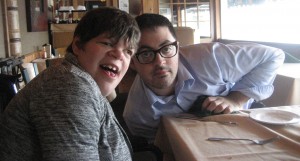Every week for the last two months or so I have written a blog post on the topic of “positive adoption terms” and the importance of using the correct language. Despite the fact that I did not grow up with a strong connection to the adoption journey, this topic of “positive language” or how one wrong word can make all of the difference in the world, has always been incredibly important to me.
My older sister Jessica was born with a microscopic deletion to a chromosome that has affected her throughout her life. Jessica can not walk or talk and has trouble communicating her wants/needs/feelings. However, she always has the biggest smile on her face, is always humming a song, and is generally a very happy girl.
Jessica does not get the credit she deserves for her level of understanding and comprehension, and I am guilty of this at times. Jessica has a knack for remembering people. Even if she’s met them only a few times or hasn’t seen them in years, her face will light up as soon as this person walks into her view.

Growing up, my younger sister and I, had responsibilities that other children our age probably did not have, and one was being an advocate for children born with disabilities. Very early on I learned that my parents were not sticklers for “swear words” and if I occasionally swore around them I would not get in trouble, however even today one word that is forbidden in my parents house is the “R” word. I can’t even type it in this post, but I will assume everyone can figure out the word I mean to say. This word is so unacceptable around my parents that last year my mother stood up in front of hundreds of audience members and asked HBO’s Bill Maher, who was speaking at the University at Buffalo, why he constantly uses the “R” word. Maher had no answer to this question and has since cut back dramatically on his use of the word.
This is why I have made it a point to post these “positive adoption terms” each week. I believe it is our job as people who work in the adoption field, as well as adoptive parents, adoptees and birth parents to educate about the adoption journey when the opportunity arises, and doing something as simple as sharing these “positive adoption terms” on your Facebook page or your Twitter account is a great start.
Now that my rant for the week is over, we can move on to the “positive adoption term” of the week: “Child placed for adoption” and its negative counterpart is “an unwanted child.”
The idea that a child was “unwanted” by their birth parents is simply not true in most cases. While all situations are different, and birth parents each have their own reasoning, an adoption plan is made out of love. Birth parents want their children. An adoption plan is made because the birth parents want more for their child than they feel they are able to provide at this moment in their lives, and that is the ultimate gift of love.

